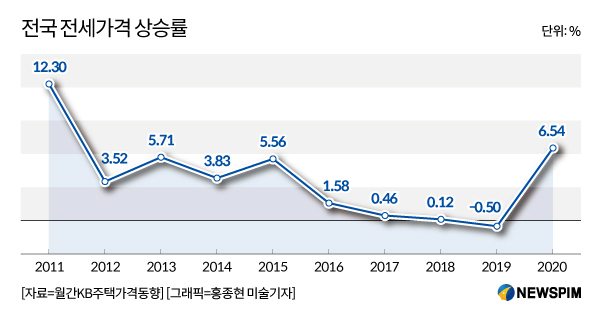[서울=뉴스핌] Reporter Park Woo-jin = It is noteworthy whether the government will stabilize the market as it expands the supply of rental housing as a way to resolve the jeonse crisis.
Purchased lease is a method in which a public institution purchases existing stock houses and puts them out for rent. It has the advantage of being able to quickly supply rental housing to the location desired by end users. However, there is a view that large-scale supply expansion will be difficult as this project requires a lot of financial resources.
◆ Government to ease the jeonse crisis by expanding the supply of purchase rental
According to the government and the real estate industry on the 8th, the government will expand the supply of purchased rental housing, one of the types of public rental. Specific plans such as supply volume and purchase conditions will be announced as early as next week.
Purchased lease is a method of buying and leasing existing buildings such as multi-family houses or villas by LH. Unlike building lease, which takes a long time from land purchase to construction, it is a method of buying existing buildings, which enables rapid supply. It is a countermeasure that can somewhat resolve the phenomenon of jeonse shortage.
It is expected that measures will be announced in the direction of supplying more than 30,000 to 40,000 households for purchase rental this year. Last year, 28,000 households were supplied nationwide.
An official from the Ministry of Land, Transport and Maritime Affairs said, “Purchased rental has the advantage of rapidly supplying rental housing to small sites in the city center,” and “a plan to expand the qualification requirements to include more consumers is being reviewed.”
Qualification conditions are also relaxed. Currently, among purchased rental houses, the youth type is less than 100% monthly average income, and the newlywed type is 70% less than the average monthly income for type 1 and 100% less than the second type. This is expected to be increased by 10-20%p (point).
In addition, it is possible to include measures to secure various high-quality houses by raising the price standard for housing land purchases.
 |
The reason for the government’s expansion of purchase rentals is the continued rise in jeonse prices despite the supply of public rental housing for 150,000 households last year.
According to the monthly KB housing price trend, the national housing jeonse price in 2020 rose by 6.54% from the end of the previous year. It recorded the largest increase since 12.30% in 2011.
◆ Limitations in resolving the jeonse crisis…requires activation of private supply
It is pointed out that although the expansion of purchases and leases may play a role in absorbing some of the demand for jeonse, there is a limit to catching the jeonse crisis.
Purchased rental housing is a method of purchasing and supplying multi-family houses, villas, and officetels. Even if the scope of housing is expanded by increasing the purchase price of buildings or land, it is questionable whether the preference of consumers will be high because the apartment is not preferred by consumers.
There are also concerns about the loss of the share to be supplied to the underprivileged. If the qualification requirements for purchased rental housing are expanded, the amount that will be supplied to the vulnerable will inevitably decrease, and this will cause damage to the vulnerable.
Ji-hae Yoon, senior researcher at Real Estate 114, said, “The demand for purchase rentals is on a steady side, but competition is fierce due to the expansion of qualification requirements, which may cause damage to the common people who need rental housing.”
There is an opinion that public leases should increase the quantity and qualification requirements while playing a natural role, but promote a plan to ensure that the privately owned supply is available. This is because public leases have a small share of the market and thus have little influence.
Shim Gyo-eon, a professor at Konkuk University’s Department of Real Estate said, “We need to come up with a plan to approach public leases such as purchased leases from the perspective of housing welfare, and to let the private sector, which has a large portion of the problem of jeonse, release the quantity.
